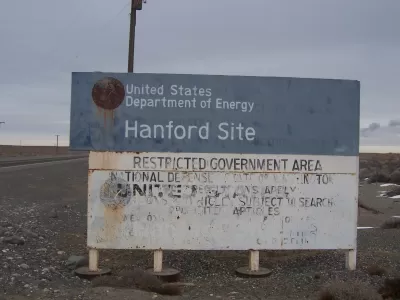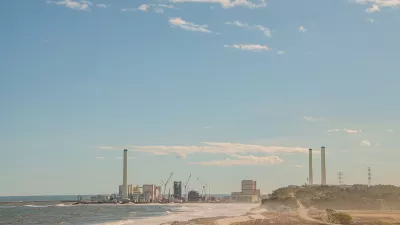A cleanup of nuclear weapons waste at Washington State's Hanford Site was first outlined in 1989. But now, as state officials wrangle with the federal government, deadlines set in 2016 may still not be met.

Washington's Hanford Site once played host to the Manhattan Project. Over the past several decades, it's been the site of one of the nation's largest nuclear cleanup efforts. But as Ralph Vartabedian reports, delays abound.
"Two multibillion-dollar industrial facilities intended to turn highly radioactive sludge into solid glass at the Hanford nuclear site have been essentially mothballed. Construction was halted in 2012 because of design flaws and Energy Department managers have foundered in finding alternatives," Vartabedian writes. Meanwhile, the storage of 56 million gallons of radioactive waste so close to the Columbia River has raised environmental concerns.
According to the state, "federal officials have taken repeated unilateral actions that will make their cleanup unlikely to meet critical deadlines set up in a 2016 consent decree in federal court." Part of that stems from cost issues. In February, a new estimate expanded the projects likely bill "from $110 billion to as much as $660 billion, a cost increase that has staggered Congress and has fueled sentiment to cut short the cleanup goals."
State officials are preparing for further legal wrangling to get the project back on track.
FULL STORY: Nation’s most ambitious project to clean up nuclear weapons waste has stalled at Hanford

Alabama: Trump Terminates Settlements for Black Communities Harmed By Raw Sewage
Trump deemed the landmark civil rights agreement “illegal DEI and environmental justice policy.”

Planetizen Federal Action Tracker
A weekly monitor of how Trump’s orders and actions are impacting planners and planning in America.

Why Should We Subsidize Public Transportation?
Many public transit agencies face financial stress due to rising costs, declining fare revenue, and declining subsidies. Transit advocates must provide a strong business case for increasing public transit funding.

Understanding Road Diets
An explainer from Momentum highlights the advantages of reducing vehicle lanes in favor of more bike, transit, and pedestrian infrastructure.

New California Law Regulates Warehouse Pollution
A new law tightens building and emissions regulations for large distribution warehouses to mitigate air pollution and traffic in surrounding communities.

Phoenix Announces Opening Date for Light Rail Extension
The South Central extension will connect South Phoenix to downtown and other major hubs starting on June 7.
Urban Design for Planners 1: Software Tools
This six-course series explores essential urban design concepts using open source software and equips planners with the tools they need to participate fully in the urban design process.
Planning for Universal Design
Learn the tools for implementing Universal Design in planning regulations.
Caltrans
Smith Gee Studio
Institute for Housing and Urban Development Studies (IHS)
City of Grandview
Harvard GSD Executive Education
Toledo-Lucas County Plan Commissions
Salt Lake City
NYU Wagner Graduate School of Public Service



























